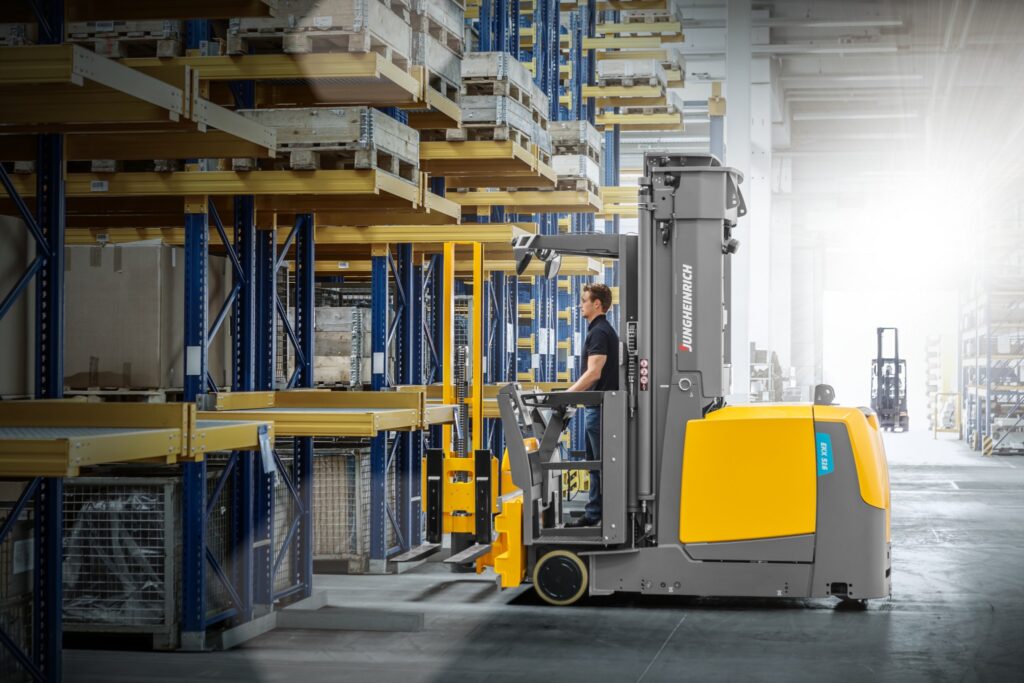Sustainable Solutions: Cleaner Alternative to Red Diesel
16th February 2021

In June 2019, the UK became the first major economy in the world to pass laws guaranteeing an end to its contribution to global warming by 2050, requiring the UK to bring all greenhouse gas emissions to net zero by this date. This will inevitably have an impact across industries and companies as they start to research and deploy new solutions to fall in line with government targets. To meet its ambitious goals, the government will introduce several initiatives over the coming years, so organisations must prepare now – not just to support global warming reduction efforts, but also reduce their costs and reap the resulting productivity benefits. Alexander Baal, Directors Sales Operations, Jungheinrich UK Ltd., explains how Lithium-Ion battery technology in the material handling industry will be an instrumental solution in supporting the government’s aggressive environmental targets, while also delivering valuable productivity gains.
Reducing red diesel
Part of the government’s initiative to tackle climate change and improve the UK’s air quality involves changing laws around the use of red diesel. From April 2022, the government plans to remove business entitlement to use this type of fuel, except for agriculture, rail and non-commercial heating. At present, businesses gain a significant benefit from using red diesel, paying a duty of just over 11p per litre, compared to almost 58p per litre for using white diesel. At Budget 2020, the Chancellor, Rishi Sunak brought attention to the fact that the sectors using red diesel are some of the biggest contributors to polluting air quality and the red diesel scheme was essentially “a tax relief on nearly 14 million tons of carbon dioxide every year.”
Despite calls by a coalition of construction trade bodies for an extension on the abolishment of red diesel to at least 2023 to allow for time for economic recovery after the pandemic, the fact remains that red diesel has a detrimental impact on the environment. In order to achieve the UK’s climate change goals, businesses will inevitably need to adapt to using cleaner sources of energy. Many will therefore need to overhaul their diesel equipment and consider more energy efficient power alternatives, such as Lithium-Ion. Addressing these issues now will increase efficiency and sustainability in the long-term, preventing any damage to business operations and ensure continuity.
Separate to the plans around red diesel, research by Calor found that 38% of forklift users are facing pressures to reduce their carbon emissions, and although 54% of those surveyed recognised that carbon reduction was a very important consideration, there were other priorities ahead of this. Above carbon concerns were cost, fuel efficiency, machinery downtime, security of supply and level of customer service from the fuel provider.
Lithium-ion batteries offer many operational and commercial benefits compared to diesel or gas-powered trucks or even lead-acid batteries. Increased efficiency and reliability is achieved as Lithium-ion delivers energy for multiple shift applications without the need for battery changes, due to its rapid charging times and the possibility of opportunity charging during short breaks. Additionally there is a very small drop in remaining capacity experienced over the entire lifecycle of the battery. Savings are made as no maintenance is required and no period of battery resting is needed after each charge. During the recharge process, less energy is wasted as heat, thus saving money, and during the truck’s operational shift, energy is harvested through direction changes and braking – resulting in lower energy costs.
An electric forklift may have a higher initial cost than its diesel or gas counterpart, however, it also benefits from lower maintenance costs as fewer service items are involved. This means the total cost of ownership can be significantly lower, especially when considering the stability of the price for electricity compared to red diesel.
Not only does Lithium-ion prove cost effective with the added benefit of having rapid return on investment (ROI), but it has the ability to support most 24×7 logistics operations with its fast charging capabilities, meaning operators won’t need to be concerned about machinery downtime.
Conscious compliance
Sustainability is key to the future of the industry and protecting the planet. The government will continue to introduce schemes, such as the impending red diesel initiative, to reduce carbon emissions in order to meet its targets and protect the environment – but the compliance of industry is essential to achieving this.
Organisations have the opportunity to proactively prepare for a sustainable future and not be caught off-guard. While it may seem like a significant undertaking to upgrade materials handling equipment, there are solutions available now that can support this shift in addition to delivering significant cost, efficiency and productivity benefits. Not only does the changing legislation around red diesel provide companies with the perfect opportunity to act, employing Lithium-Ion as an energy-efficient solution will also protect organisations against future legislative changes and work towards a more sustainable future, while ensuring business productivity and success.

